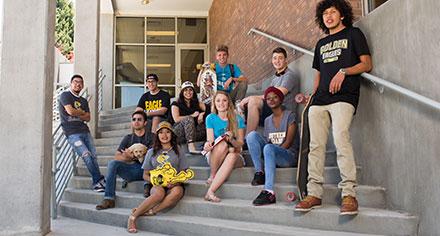Earn College Credits While Still in High School
Get a Jump-Start on College
 If you are a high school student who would like to earn college credits before graduating high school, then dual credit classes may be right for you.
If you are a high school student who would like to earn college credits before graduating high school, then dual credit classes may be right for you.
A Dual Credit course is a college course for which you can earn both college and high school credit concurrently. Courses may be offered on the high school campus and taught by a high school or college instructor, through distance delivery over the CSI microwave system, via the internet, or they may be offered on the college campus.
What is Dual Credit?
Dual enrollment programs are the partnership between high schools and a college to provide college-level classes to students still in high school. This is also sometimes called "concurrent enrollment" or "early college".
Dual credit coursework enables you to make substantial progress toward a college degree before finishing high school. When you complete a dual credit course, your grade and credit are recorded on both your high school and college transcripts.
Unlike high school AP classes which prepare students to pass an exam to prove their mastery of college-level curriculum, students taking dual credit courses are actually enrolled in college classes for college credit.
Early exposure to the college experience may help you stay on track with your college goals.
Is Dual Credit Right for Me?
You should meet with an advisor or high school counselor to evaluate whether accelerated learning is the best option for you. Dual credit classes often count towards your college core requirements, which mean you may be able to complete your degree earlier. Dual credit classes also give you the experience and confidence that comes with completing real college classes.
Since you would be taking college classes, you will need to pay tuition. Fortunately, dual credit classes cost less than paying full college price, and there is additional financial help available through the State of Idaho Advanced Opportunities.
All Dual Credit coursework serves as a beginning to your college transcript. A college transcript that reflects solid academic performance is the gateway to further studies in post-secondary education.
Your advisor or high school counselor can help you determine if you are ready for college-level classwork.
Or were you looking for something else?
I want credit for my industry certification
You can earn college credit by demonstrating mastery of course outcomes from experiential learning. Experiential learning includes work experience, life experience, licenses and certifications. You can earn credit by exam or by submitting a portfolio with sufficient evidence of skills and proficiency with course outcomes.
I want help getting ready for college
The College and Career Readiness provides many programs and services to help you build your confidence for learning. Our aim is to assist you to achieve your educational goals. If you want a GED/HSE, or want to improve your language, writing, reading, math, or study skills to prepare you for your certificate or degree, we're here to serve you.